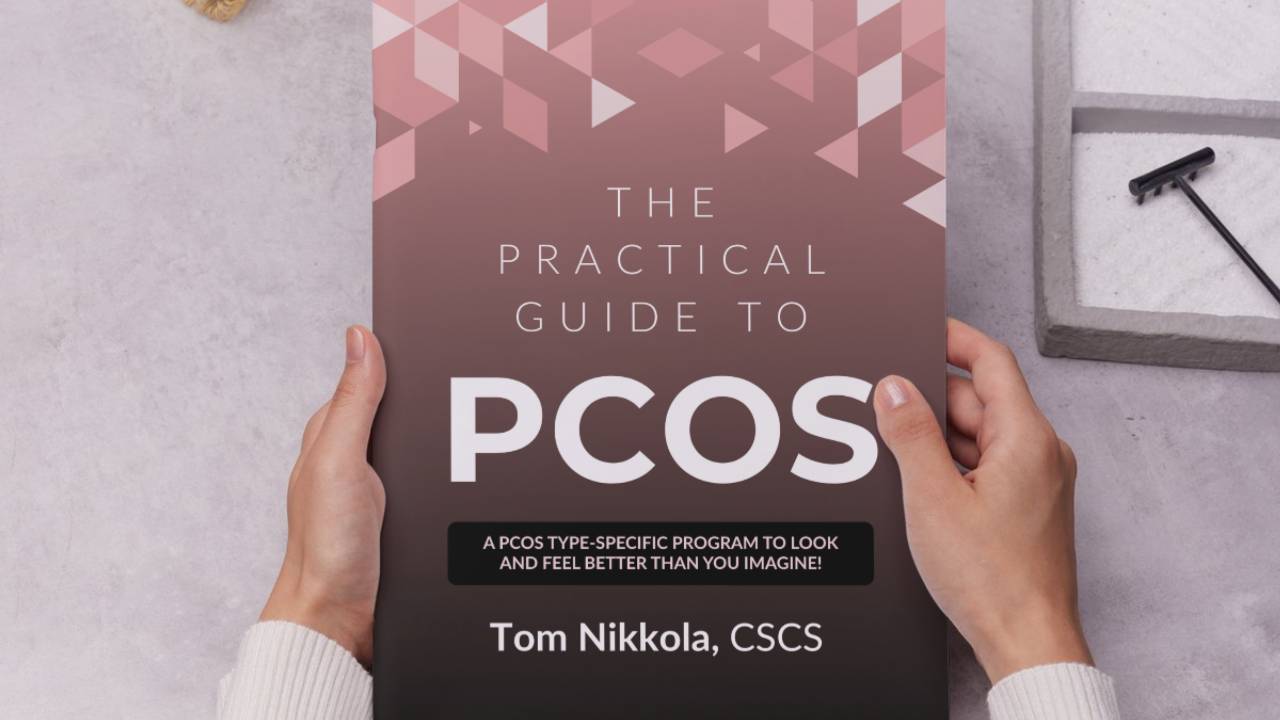
Semaglutide: Weight Loss Miracle or Risky Medication?
Apr 25, 2023A while back, my wife, Vanessa, asked me if I’d heard about this new weight loss drug called semaglutide. Neither one of us pay attention to celebrities, but she somehow came across some posts about it. I hadn’t heard about it, and wondered if it was something special or another oily-stool-disaster-waiting-to-happen like orlistat. It turns out that semaglutide could be a great way to bolster the results of a good nutrition and exercise plan (like what I write about in The 3 Pillars of VIGOR).
Using semaglutide without eating a higher-protein diet and strength training regularly will undoubtedly lead to significant muscle loss and increase the likelihood you’ll regain more body fat than before you started using it, if you ever stopped the medication. For those who remain on it long-term without eating a high-protein diet and strength training, they’ll be more likely to develop osteoporosis and frailty, just like they would if they followed a long-term, calorie-restricted diet without proper nutrition and exercise.
With all that said, semaglutide appears to be a powerful tool to use with a high-protein diet and resistance training program. In my opinion, fitness centers that partner with weight loss or anti-aging clinics would be the perfect place to offer this therapy, as patients would be immersed in an environment that emphasizes the diet and exercise practices necessary to get the best results with the medication.
What is Semaglutide?
Semaglutide, a glucagon-like peptide-1 (GLP-1) receptor agonist, has been making waves in the world of weight loss and diabetes management. It is sold under the brand names Wegovy, Ozempic, and Rybelsus. Recently, several studies have demonstrated its potential in not only helping individuals with type 2 diabetes but also those who want to lose weight effectively.
To fully appreciate semaglutide’s potential for weight loss, it’s essential to understand what GLP-1 is and how semaglutide interacts with it. GLP-1, or glucagon-like peptide-1, is a hormone produced in your gut that plays a vital role in regulating blood sugar levels and appetite. By mimicking the effects of GLP-1, semaglutide can help you better manage your weight and improve your overall health.
How GLP-1 Works
GLP-1 is released in response to food consumption and works in several ways to help maintain healthy blood sugar levels and control your appetite. These functions include:
- Stimulating insulin production: GLP-1 promotes the release of insulin, a hormone that helps lower blood sugar levels by allowing glucose to enter your cells.
- Suppressing glucagon secretion: Glucagon is a hormone that raises blood sugar levels by stimulating the release of stored glucose. GLP-1 helps to suppress glucagon secretion when it’s not needed, preventing excessive glucose release.
- Slowing gastric emptying: GLP-1 slows down the rate at which food moves through your stomach, allowing for better nutrient absorption and a prolonged feeling of fullness.
- Reducing appetite: GLP-1 influences the brain’s appetite control center, reducing hunger and calorie intake.
Semaglutide as a GLP-1 Receptor Agonist
Semaglutide was discovered by researchers at Novo Nordisk, a Danish pharmaceutical company, and was first approved by the FDA in 2017 for treating type 2 diabetes. The discovery of semaglutide resulted from a long research and development process. Novo Nordisk screened thousands of compounds and conducted extensive preclinical and clinical testing to evaluate their safety and efficacy. This research aimed to identify a new class of drugs that could improve glycemic control, reduce the risk of cardiovascular events, and induce weight loss in patients with type 2 diabetes and obesity.
Semaglutide, a glucagon-like peptide-1 receptor agonist, was ultimately identified as a promising candidate and was further developed and refined through a series of clinical trials.
Semaglutide is a synthetic version of GLP-1 that has been modified to last longer in your body, providing more sustained benefits. As a GLP-1 receptor agonist, semaglutide binds to the same receptors as natural GLP-1, effectively stimulating the same physiological responses. This results in improved blood sugar control, reduced appetite, and weight loss.
Semaglutide Weight Loss: What the Research Says
Over the past few years, numerous studies have shed light on the potential of semaglutide as an effective weight loss treatment. Let’s take a closer look at some of the key findings that have solidified its reputation as a promising option for those struggling with obesity.
Semaglutide’s Long-Term Efficacy and Safety
A 2023 systematic review and meta-analysis analyzed the long-term efficacy and safety of semaglutide for obesity. The researchers found that semaglutide led to significant weight loss, with an average difference of -6.36 kg compared to the placebo group. Although gastrointestinal adverse events were more common among those taking semaglutide, most were mild to moderate and transient, indicating that the drug is generally safe and well-tolerated.
Comparison to Other Weight Loss Medications
When compared to other weight loss medications, semaglutide has shown superior results. In a study by Davies et al., semaglutide led to greater weight loss than other GLP-1 receptor agonists, such as liraglutide and exenatide, and as other anti-obesity medications like orlistat and phentermine/topiramate.
The STEP Trials: Semaglutide’s Real-World Impact
The Semaglutide Treatment Effect in People with Obesity (STEP) trials further demonstrated the drug’s effectiveness in real-world settings. These trials involved more than 4,500 participants and showed that those who took semaglutide lost an average of 15% of their body weight over 68 weeks, compared to just 2.4% for those on a placebo. This substantial weight loss can significantly impact overall health, potentially reducing the risk of obesity-related complications like type 2 diabetes, cardiovascular diseases, and certain types of cancer.
Semaglutide Dosage and Administration
Now that we’ve explored the weight loss potential of semaglutide, let’s discuss the appropriate dosage and administration to ensure optimal results and minimize side effects.
Recommended Dosage
Semaglutide is typically prescribed as a once-weekly subcutaneous injection, making it a convenient option for those looking to manage their weight without the hassle of daily medication. The recommended starting dose for semaglutide is 0.25 mg per week, which should be gradually increased over time to minimize gastrointestinal side effects.
The dosage can be increased every four weeks, as follows:
- Weeks 1-4: 0.25 mg once weekly
- Weeks 5-8: 0.5 mg once weekly
- Weeks 9-12: 1 mg once weekly
- Weeks 13 and beyond: 2 mg once weekly (if needed, based on individual response and tolerability)
Your healthcare provider may adjust your dosage based on your specific needs and response to the medication.
How to Administer Semaglutide
Ozempic and Wegovy are administered as subcutaneous injections, which means they’re injected just under the skin, usually in the thigh, upper arm, or abdomen. It’s important to follow your healthcare provider’s instructions and rotate injection sites to avoid irritation and ensure proper absorption.
Rybelsus comes as an oral tablet. Taking the pill might sound more appealing, but remember that all oral medications must pass through the liver. Since most people who use semaglutide will take it long-term, it might be better to opt for the injectable form in the event the drug can lead to long-term liver issues.
Potential Side Effects
As with any medication, semaglutide comes with potential side effects. The most common side effects are gastrointestinal in nature, including nausea, vomiting, diarrhea, and constipation. Most of these side effects are mild to moderate and tend to resolve on their own as your body adjusts to the medication. However, if side effects persist or worsen, consult your healthcare provider.
Semaglutide Benefits Beyond Weight Loss
While the primary focus of this guide is semaglutide for weight loss, it’s important to highlight the additional benefits this medication can offer. As a GLP-1 receptor agonist, semaglutide has the potential to positively impact various aspects of your health, beyond just weight management.
Improved Glycemic Control
Semaglutide significantly improves blood sugar control in people with type 2 diabetes. By stimulating insulin secretion and suppressing glucagon production, it helps maintain stable blood sugar levels throughout the day, reducing the risk of diabetes-related complications such as nerve damage, kidney disease, and vision loss.
Cardiovascular Health
Research shows that semaglutide can lower the risk of major cardiovascular events, such as heart attacks, strokes, and cardiovascular-related death, in people with type 2 diabetes. This is particularly significant given the strong link between obesity and cardiovascular diseases.
Enhanced Quality of Life
Weight loss achieved through semaglutide use may improve quality of life, including increased self-esteem, better mobility, and reduced joint pain.20 Additionally, better glycemic control and cardiovascular health can translate into an overall improvement in daily living, making semaglutide a comprehensive solution for individuals seeking not only weight loss but a healthier lifestyle.
Is Semaglutide Right for You?
Now that we’ve discussed the science behind semaglutide, its weight loss potential, and additional health benefits, you may wonder if it’s the right choice. This section will help you determine whether semaglutide could be a viable option to support weight loss. If you believe you’re a good candidate, you can then talk to your doctor about how to procede.
Who Can Benefit from Semaglutide?
Semaglutide may be a suitable option for individuals who:
- Have a BMI of 30 or higher (indicating obesity) or a BMI of 27 or higher with at least one weight-related health condition, such as type 2 diabetes or high blood pressure.
- Have struggled to achieve significant weight loss through diet and exercise alone.
- Are looking for a medication that offers additional health benefits, such as improved glycemic control and cardiovascular risk reduction.
Consult Your Healthcare Provider
Before starting any new medication, it’s crucial to consult your healthcare provider. They can evaluate your medical history, current medications, and overall health to determine if semaglutide is an appropriate option for you. They can also provide guidance on the proper dosage, administration, and potential side effects, ensuring you have the support needed to make an informed decision.
Important! Use Semaglutide Only In Combination With a Higher-Protein Diet and Professionally-Designed Resistance Training Program.
It’s important to remember that semaglutide should be used in conjunction with a healthy, high-protein diet and regular resistance training to achieve optimal results. Without sufficient protein and consistent strength training, you will likely lose significant muscle mass and bone density.
Frequently Asked Questions
In this section, we’ll address some frequently asked questions about semaglutide, providing answers and insights to help you make an informed decision about this medication.
What happens when you stop taking semaglutide? Do you gain the lost weight back?
Stopping semaglutide may result in weight regain, as the medication’s appetite-suppressing effects will no longer be present. To maintain weight loss, it’s crucial to continue eating a healthy, high-protein diet, strength training consistently, and getting enough sleep each night.
Why is it so important to strength train and eat a high-protein diet when using the medication for weight loss? Strength training and a high-protein diet can help preserve lean body mass while losing weight. This is essential for maintaining a healthy metabolism, improving body composition, and reducing the risk of weight regain.
How does semaglutide compare to berberine?
Semaglutide and berberine are two different compounds with different mechanisms of action and effects on the body.
Semaglutide is a glucagon-like peptide-1 (GLP-1) receptor agonist that works by stimulating the release of insulin and reducing the production of glucagon, leading to improved glycemic control and weight loss. Semaglutide has been shown in clinical trials to be highly effective in reducing HbA1c levels, inducing weight loss, and reducing the risk of cardiovascular events in patients with type 2 diabetes and obesity.
Berberine, on the other hand, is a plant-based compound that has been used for centuries in traditional Chinese medicine to treat a variety of ailments, including type 2 diabetes. Berberine has been shown in some studies to have beneficial effects on blood glucose levels and lipid metabolism, although the evidence is mixed and the mechanisms of action are not fully understood. Some studies suggest that berberine may work by activating the AMP-activated protein kinase (AMPK) pathway, which plays a key role in regulating cellular energy metabolism.
While both semaglutide and berberine have been studied for their effects on blood glucose levels and weight loss, they are not directly comparable in terms of their efficacy or safety. Semaglutide has been extensively tested in large-scale clinical trials and has been shown to be highly effective in improving glycemic control and inducing weight loss, but it may also have potential side effects, including gastrointestinal symptoms and pancreatitis.
What is the difference between semaglutide (Ozempic) and dulaglutide (Trulicity)?
Dulaglutide and semaglutide are both glucagon-like peptide-1 (GLP-1) receptor agonists, a class of medications used to treat type 2 diabetes and, in the case of semaglutide, obesity as well. Despite being in the same class, they have some differences in terms of their chemical structure, dosing, and clinical efficacy.
- Chemical structure: While both dulaglutide and semaglutide are based on the native GLP-1 structure, they have been modified to prolong their action in the body. Semaglutide is more similar to native GLP-1 than dulaglutide, which is a fusion protein consisting of two GLP-1 analogs linked to an immunoglobulin G4 (IgG4) heavy chain.
- Dosing: Both medications are administered as subcutaneous injections, but their dosing schedules differ. Semaglutide is typically given once weekly, with the dose gradually increased over time to minimize gastrointestinal side effects. Dulaglutide is also given once weekly, but it is available in fixed doses of 0.75 mg, 1.5 mg, 3 mg, and 4.5 mg, depending on the individual’s needs and response to the medication.
- Clinical efficacy: Both semaglutide and dulaglutide lower blood glucose levels and promote weight loss in people with type 2 diabetes. However, in head-to-head trials, semaglutide has demonstrated superior efficacy in terms of blood glucose control and weight loss compared to dulaglutide.
Overall, both dulaglutide and semaglutide are effective GLP-1 receptor agonists with some differences in chemical structure, dosing, and clinical efficacy. The choice between these two medications depends on individual factors, such as patient preference, tolerability, and the specific goals of therapy. It’s essential to consult a healthcare provider to determine which medication is most suitable for a given patient.
What are the different Semaglutide brands available?
Semaglutide is currently marketed under several brand names, including:
- Ozempic: Ozempic is a once-weekly injectable formulation of semaglutide that is used to treat type 2 diabetes and obesity.
- Rybelsus: Rybelsus is an oral tablet form of semaglutide that is used to treat type 2 diabetes.
- Wegovy: Wegovy is a higher-dose injectable form of semaglutide that was recently approved by the FDA for the treatment of chronic weight management in adults with obesity or overweight who have at least one weight-related condition, such as type 2 diabetes, high blood pressure, or high cholesterol.
What contraindications exist?
Semaglutide should not be used by individuals with a personal or family history of medullary thyroid carcinoma or multiple endocrine neoplasia syndrome type 2, as it may increase the risk of thyroid tumors. Additionally, it is not recommended for those with a history of severe allergic reactions to semaglutide or any of its components.
How does it affect appetite?
Semaglutide works by mimicking the effects of the naturally occurring hormone GLP-1, which helps regulate appetite and promote feelings of fullness. This leads to a reduced calorie intake and supports weight loss.
Does it affect sleep or energy levels?
Some people may experience gastrointestinal side effects, such as nausea, which could potentially affect sleep or energy levels. However, these side effects are generally mild to moderate and tend to resolve over time as the body adjusts to the medication.
Conclusion
Semaglutide has emerged as a powerful tool in the fight against obesity, offering substantial weight loss potential and additional health benefits. As a GLP-1 receptor agonist, it works by regulating appetite and promoting feelings of fullness, making it easier to reduce calorie intake and achieve long-term weight loss.
Research has consistently demonstrated the efficacy of semaglutide in promoting weight loss, improving glycemic control, and reducing the risk of cardiovascular events. Moreover, it has been shown to be more effective than other weight loss medications, further establishing its reputation as a promising option for those struggling with obesity.
Before starting semaglutide, it’s crucial to consult your healthcare provider to determine if it’s the right choice for you, taking into account your medical history, current medications, and overall health. Remember that semaglutide should be used alongside a healthy diet and regular exercise to achieve the best results.
With the right guidance and support, semaglutide can be a valuable part of your weight loss journey, helping you achieve not only a healthier weight but also a higher quality of life. Armed with the information and answers to common questions provided in this guide, you’ll be better prepared to discuss semaglutide with your healthcare provider and make an informed decision about whether this medication is right for you.






